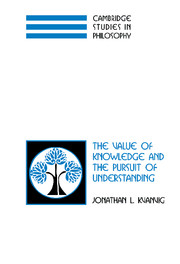Book contents
- Frontmatter
- Contents
- Introduction
- 1 The Value of Knowledge Is External to It
- 2 The Value of True Belief
- 3 The Value of Justification
- 4 Reliabilism, Normativity, and the Special Promise of Virtue Epistemology
- 5 The Gettier Problem and the Value of Knowledge
- 6 Knowledge as Irreducibly Valuable
- 7 Epistemic Attitudinalism: Semantic and Pragmatic Approaches
- 8 Knowledge and Understanding
- 9 Conclusion
- References
- Index
8 - Knowledge and Understanding
Published online by Cambridge University Press: 14 August 2009
- Frontmatter
- Contents
- Introduction
- 1 The Value of Knowledge Is External to It
- 2 The Value of True Belief
- 3 The Value of Justification
- 4 Reliabilism, Normativity, and the Special Promise of Virtue Epistemology
- 5 The Gettier Problem and the Value of Knowledge
- 6 Knowledge as Irreducibly Valuable
- 7 Epistemic Attitudinalism: Semantic and Pragmatic Approaches
- 8 Knowledge and Understanding
- 9 Conclusion
- References
- Index
Summary
We have been unable to unearth some unique value for knowledge, contrary to the ordinary conception of things. This result leaves us with somewhat of a dilemma, for it would be hard to defend the position that the common viewpoint is wholly without merit. Not that we are anywhere close to claiming such about the common view of knowledge, for our findings that true belief, subjective justification, and displays of intellectual virtue are valuable puts us already within the general locale of knowledge, even if knowledge itself is not uniquely valuable. Furthermore, nothing argued here suggests that knowledge is not valuable. What has been argued is rather a more specialized point: that the problem suggested by Socrates in the Meno concerning whether knowledge has more value than its subcomponents is a problem requiring a negative answer. Knowledge is valuable, to be sure, but its value is exhausted by the value of a subset of its constituents.
This result may be in part a product of a bit of myopia on the part of contemporary epistemologists, given the debates among philosophers of the ancient period about the best translation of the Greek term that is commonly translated ‘knowledge’. For some argue that the term ought to be translated as ‘understanding’. Given this fact, it may be a mistake to identify the problem of the Meno with any question about the value of knowledge.
- Type
- Chapter
- Information
- The Value of Knowledge and the Pursuit of Understanding , pp. 185 - 203Publisher: Cambridge University PressPrint publication year: 2003



